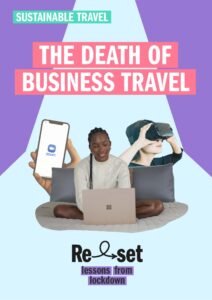The reasons behind this decline in business travel are relatively simple to follow: once the pandemic took hold and populations were required to work from home wherever possible, business travel became unnecessary.
“When we held the Cambridge Sustainability Commission on Scaling Behaviour Change, we decided not to fly everyone in. Instead we held it online and it worked really well. It gave us more flexibility on timing, we found people were more available to have in-depth conversations. The financial cost and carbon budgets was also of course dramatically lower. This is a great lesson to take from lockdown – there really is
scope to cut back on unnecessary travel.”
Peter Newell, Prof International Relations, University of Sussex
The meteoric rise of Zoom and Microsoft teams made connecting, collaborating and working with people all over the world an accessible reality for millions of people. It also became more socially acceptable; these virtual platforms had been in use by some organisations for some years, but face-to-face meetings were still considered a more respectful and appropriate way of communicating for the majority. Suddenly, the offer of an online meeting was not only acceptable; it was a relief.

This story is part of the Reset series – a collection of short downloadable stories that look in more detail at over consumption and unnecessary travel. They consider some of the key messages and solutions that have become apparent during the pandemic that could help us make the rapid transition to a more sustainable future.
This guide has been made possible by the support of ClimateWorks Foundation.
 The global pandemic may have sounded the death knell for business travel. While it’s too soon to tell for certain, the initial numbers suggest that we may have seen the peak of business travel in 2019. In the latest story from the Reset series we look at how businesses realised they don’t have to meet everyone face to face anymore, saving time and energy, while improving employee well-being.
The global pandemic may have sounded the death knell for business travel. While it’s too soon to tell for certain, the initial numbers suggest that we may have seen the peak of business travel in 2019. In the latest story from the Reset series we look at how businesses realised they don’t have to meet everyone face to face anymore, saving time and energy, while improving employee well-being.